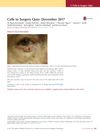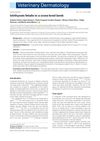23 citations,
October 2009 in “Gastroenterology” Vitamin D is crucial for bone health and preventing serious diseases.
 12 citations,
January 2016 in “Journal of Clinical and Investigative Dermatology”
12 citations,
January 2016 in “Journal of Clinical and Investigative Dermatology” Low vitamin D levels are common in people with Alopecia Areata.
12 citations,
September 1997 in “PubMed” Vitamin D could be important for many skin functions and synthetic versions may treat various skin diseases.
 6 citations,
February 2021 in “Frontiers in Cell and Developmental Biology”
6 citations,
February 2021 in “Frontiers in Cell and Developmental Biology” Eating too much or too little vitamin A can cause hair loss.
 6 citations,
January 2020 in “Postepy Dermatologii I Alergologii”
6 citations,
January 2020 in “Postepy Dermatologii I Alergologii” Check and treat low iron and vitamin D levels in people with hair loss.
 5 citations,
June 2020 in “Experimental dermatology”
5 citations,
June 2020 in “Experimental dermatology” Redheaded people may have evolved to efficiently make vitamin D in areas with less sunlight.
5 citations,
September 2019 in “The Open biomarkers journal” Linoleic acid (Vitamin F) can help protect against the harmful effects of acrylamide.
 5 citations,
May 2018 in “Journal of the American Academy of Dermatology”
5 citations,
May 2018 in “Journal of the American Academy of Dermatology” Lower vitamin D levels might be linked to more severe alopecia areata, but more research is needed to understand if vitamin D can help treat it.
2 citations,
October 2016 in “Nutrition in clinical practice” Vitamin B12 deficiency can cause facial dark spots that go away with treatment.
 1 citations,
April 2019 in “Endokrynologia Polska”
1 citations,
April 2019 in “Endokrynologia Polska” Healthy diet and exercise are important for women with PCOS to manage weight and metabolic issues, and supplements like omega-3, vitamin D, and inositol may help.
 1 citations,
November 2017 in “The journal of investigative dermatology/Journal of investigative dermatology”
1 citations,
November 2017 in “The journal of investigative dermatology/Journal of investigative dermatology” Mohs micrographic surgery is effective for treating basal cell carcinoma on the eyelid, while radiotherapy has higher recurrence rates, and topical vitamin D3 may reduce and delay BCC formation in mice.
 October 2024 in “Dermatology Practical & Conceptual”
October 2024 in “Dermatology Practical & Conceptual” Vitamin D3 deficiency is common in Pakistanis with diffuse hair fall, and early treatment is advised.
 April 2024 in “Nepal journal of dermatology, venereology & leprology”
April 2024 in “Nepal journal of dermatology, venereology & leprology” Vitamin D is important for skin health and can help treat and prevent various skin conditions.
 August 2017 in “Journal of epidemiological research”
August 2017 in “Journal of epidemiological research” Cancer rates are increasing in developed countries, with estrogen, aging, low vitamin D3, and HPV infection as common causes.

The vitamin D receptor has many roles in the body beyond managing calcium, affecting the immune system, hair growth, muscles, fat, bone marrow, and cancer cells.
 June 1937 in “Science news-letter/Science news letter”
June 1937 in “Science news-letter/Science news letter” Vitamin B can prevent hair from turning gray in rats.
 16 citations,
March 2015 in “Wiener Klinische Wochenschrift”
16 citations,
March 2015 in “Wiener Klinische Wochenschrift” Vitamin D deficiency is common in women with PCOS and linked to some metabolic problems, but not the main cause of their metabolic issues.
 October 2024 in “Frontiers in Nutrition”
October 2024 in “Frontiers in Nutrition” Vitamin D deficiency is common in people with certain types of hair loss, like alopecia areata and female pattern hair loss.
 April 2022 in “JAAD International”
April 2022 in “JAAD International” Women with frontal fibrosing alopecia have similar vitamin D levels to those with other hair loss types, suggesting vitamin D is not a key factor in this condition.
 1 citations,
June 2017 in “Veterinary dermatology”
1 citations,
June 2017 in “Veterinary dermatology” A cross-bred lamb with severe skin and movement issues had ichthyosis fetalis but normal vitamin A levels.
 1533 citations,
October 2008 in “Endocrine reviews”
1533 citations,
October 2008 in “Endocrine reviews” Mice without the vitamin D receptor have bone issues and other health problems, suggesting vitamin D is important for preventing various diseases in humans.
 400 citations,
January 2014 in “British Journal of Sports Medicine”
400 citations,
January 2014 in “British Journal of Sports Medicine” The consensus provided guidelines for treating the Female Athlete Triad and a system to decide when athletes can return to sports.
148 citations,
October 2008 in “The journal of investigative dermatology/Journal of investigative dermatology” Mice without the vitamin D receptor are more prone to UV-induced skin tumors.
110 citations,
November 1984 in “The American Journal of Medicine” A genetic defect in vitamin D receptors causes severe rickets and hair loss in children, but some heal as they age.
56 citations,
September 2010 in “Veterinary pathology” Certain mouse strains develop a skin condition similar to a human hair loss disease due to genetic defects.
 48 citations,
February 2008 in “Nutrition in Clinical Practice”
48 citations,
February 2008 in “Nutrition in Clinical Practice” Dietary changes, including weight loss and a balanced diet, are important for managing PCOS, especially in overweight women.
 30 citations,
January 2009 in “Nuclear Receptor Signaling”
30 citations,
January 2009 in “Nuclear Receptor Signaling” Hairless protein is crucial for healthy skin and hair, and its malfunction can cause hair loss.
23 citations,
September 2016 in “Archives of Dermatological Research” Vitamin D levels do not affect the risk of developing alopecia areata.
 20 citations,
May 2016 in “Journal of Cosmetic Dermatology”
20 citations,
May 2016 in “Journal of Cosmetic Dermatology” Low vitamin D receptor levels found in hair loss patients; topical vitamin D treatment suggested.
18 citations,
July 2010 in “Journal of steroid biochemistry and molecular biology/The Journal of steroid biochemistry and molecular biology” The vitamin D receptor helps regulate skin and hair health independently of its usual vitamin D ligand.




















